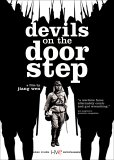| Reviews & Columns |
|
Reviews DVD TV on DVD Blu-ray 4K UHD International DVDs In Theaters Reviews by Studio Video Games Features Collector Series DVDs Easter Egg Database Interviews DVD Talk Radio Feature Articles Columns Anime Talk DVD Savant Horror DVDs The M.O.D. Squad Art House HD Talk Silent DVD
|
DVD Talk Forum |
|
|
| Resources |
|
DVD Price Search Customer Service #'s RCE Info Links |
|
Columns
|
|
|
Devils on the Doorstep
Actor/Director Wen Jiang's Devils on the Doorstep won the Grand Jury prize at the 2000 Cannes Film Festival, but when it came time to be released in its native China, the film was banned due to its (in Chinese censors opinion) unfavorable portrayal of the WW2 Japanese occupying forces and Chinese villagers. And that is nothing less than a crying shame.
1945. Dasan Ma (Wen Jiang) is a simple guy, with a simple life, living in the village of Rack-Armor Terrace located in remote Northern China. Then, one night, he and his mistress are interrupted when a shadowy stranger barges into Dasan's home, points a gun to his head, and leaves two captured men, a Chinese interpreter and a Japanese soldier, on his doorstep. The Kafakesque scenario he faces is this, someone he doesn't know has left prisoners under Dasan's care, he has to hide them from the Japanese Naval squad stationed nearby, he is told to interrogate the duo (about what, he has no idea), and if Dasan doesn't do so, the mystery man says he will return and slaughter the village.
What unfolds is an epic comedy that takes turns to the dramatic, culminating in one whopper of a tragic ending. Devils on the Doorstep is movie that is alive with energy, wit, slapstick, and sober pathos.
The fact that this film was banned boggles my mind and makes me realize I'm just not as bright or culturally in tune as I think I am. The film doesn't take an overtly political or social stab like, say, the early works of Zhang Yimou. Without revealing too much (something I'm definitely side-stepping, even with the plot synopsis), the film doesn't shy away from the Japanese occupying forces callousness and sub-human behavior. But, it also presents them as mortal, with a depth beyond that of being one-sided monsters. Likewise, the provincial villagers are also seen with more than just one layer, at first, relatively unfettered by the occupying soldiers, just going on with their lives until the mystery man burdens them with their captives. And that seems to be where the Chinese censors found a problem- the film was too humanistic. And that anyone would have a problem with that saddens me to no end.
But, at least we have the film. We can watch it. And it is a brilliant satire. At least we get to see the village elders doing their bumbling best to decide what to do with the men. The complications of hiding them. The difficulty in hiring an assassin. The panicked captive interpreter translating everything the peeved, proud, death wish having soldier says as positive (explaining that everything the Japanese say sounds pissed off). Moments of exhausting tension broken by amorous donkeys. And then, the tragic turn, unfathomably sad, profound, and one of the most memorable final shots I've ever seen.
The DVD: Home Vision Entertainment. Home Vision notes that this is the director's 140 minute cut. The Cannes version was some 160 minutes long and apparently no longer exists. I didn't feel I needed any more from the film, the running time felt perfect, though, I am extremely interested in seeing those deleted sections.
Picture: Anamorphic Widescreen. Shot in striking Black & White (except for two shots where it goes to color), it does not have the faux, clean, processed feel of something like Ed Wood or The Man Who Wasn't There. Instead, it is very grainy and coarse. If not for the handheld camera movement, one would swear the film was a relic of the 40's or 50's. Pretty much flawless.
Sound: Dolby Digitlal 5.1 Surround or 2.0 Stereo. Optional English subtitles. The sound is deceptively simple, sticking to atmospherics and dialogue with no scoring other than the Japanese Naval marching band parading around. Surprisingly, the 5.1 Surround actually manages a good deal of separation and use of the surround channels when it comes to the dialogue scenes. The subs are well-rendered.
Extras: Introduction by Steven Soderbergh (3:58). Soderbergh briefly talks about the film and how he was introduced to it, as well as his fortune in serving with Wen Jiang on the Cannes jury.— Liner Note interview with Wen Jiang.--- Trailer.
Conclusion: At times fervently goofy, dark, violent, and bitterly ironic, Wen Jiang's Devils on the Doorstep is one of those films that makes you realize the power of cinema and how it can work on many levels. It is a film of entertainment and insight, beautifully acted, and expertly shot. The transfer is quite good, though it deserves even better treatment, more extras, more discussion, more praise. But, thank god- or whatever- that we live in a country where we are free to watch these kind of films and, hopefully, be all the better for it.
|
| Popular Reviews |
| Sponsored Links |
|
|
| Sponsored Links |
|
|
| Release List | Reviews | Shop | Newsletter | Forum | DVD Giveaways | Blu-Ray | Advertise |
|
Copyright 2024 DVDTalk.com All Rights Reserved. Legal Info, Privacy Policy, Terms of Use,
Manage Preferences,
Your Privacy Choices | |||||||














